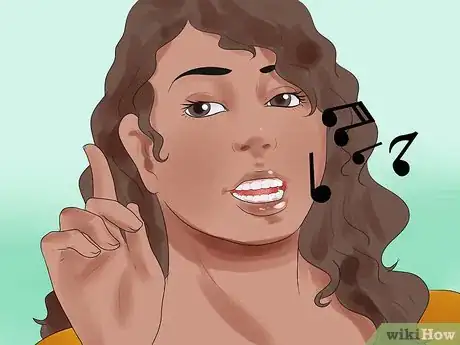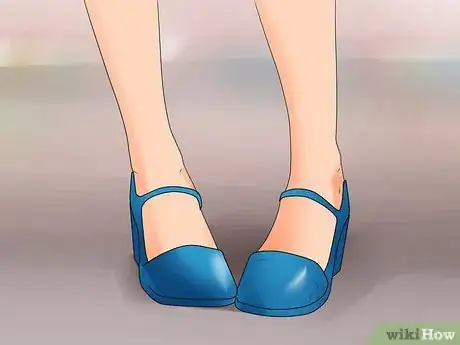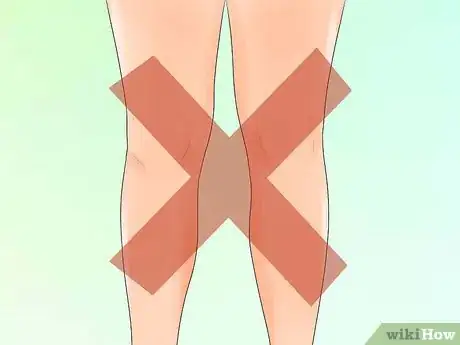This article was co-authored by Tanisha Hall. Tanisha Hall is a Vocal Coach and the Founder and Executive Director of White Hall Arts Academy, Inc. an organization based in Los Angeles, California that offers a multi-level curriculum focused on fundamental skills, technique, composition, theory, artistry, and performance at a conservatory level. Ms. Hall's current and previous students include Galimatias, Sanai Victoria, Ant Clemons, and Paloma Ford. She earned a BA in Music from the Berklee College of Music in 1998 and was a recipient of the Music Business Management Achievement Award.
There are 9 references cited in this article, which can be found at the bottom of the page.
This article has been viewed 37,658 times.
To sing like Mariah Carey, you need to improve your singing technique overall, including your vocal range. You'll also need to practice the way professionals do, such as warming up your voice before singing and standing with correct posture. You can also employ some general tips to help you sing better and sound more like Mariah Carey.
Steps
Singing Like Carey
-
1Work on holding long notes. Carey is known for being able to hold long notes (up to 20 seconds).
- Practice holding notes for as long as you can. Chose a single syllable and note, like "ah."
- Take a deep breath, and then try to hold the note as long as you can. Time yourself while you do it, so you can see improvement.
- Practice every day to improve your lung capacity over time.
-
2Use airy tones. Carey tends to pull into airy tones sometimes after hitting high notes. However, only use these sparingly, as most voice coaches consider this a vocal weakness. Carey backs hers up with strong, belted notes that phase into airy tones.
- Most amateur singers have no trouble with airy notes, as airy notes are created by improper technique. It's the strong, belted notes that are more difficult.
Advertisement -
3Learn to belt. Belting is the ability to pull your chest voice into your head voice.
- Separate your chest voice from your head voice. Your chest voice is your mid-range voice. You'll notice the vibrations from singing are mostly in your chest. As you go higher in your range, you'll feel your head voice kick in, as the sound moves from the front of your mouth to the back.
- Choose a space where you can make as much noise as you want. Relax any tension in your shoulders by taking some deep breaths.
- Lower your jaw, and lift your soft palate.The soft palate is the roof of your mouth. Lifting the soft palate creates a better, more resonant sound. Using a mirror, say "hung-ah," and see how your palate moves. You should be able to feel what you need to do to lift the soft palate.[1]
- Use less air as you move to the higher notes.
- Pull the sound forward to the front of your face.
-
4Work on a clear tone. Though Carey does employ a breathy tone at times, she has a very clear, resonant tone most of the time.[2]
- One way to develop a clear tone is to practice "saying" different words at certain pitches. It's easier to hear how to clarify the tone when your speaking the words, and it crosses over into singing.
Improving Vocal Range
-
1Gradually sing notes higher and lower. Over time, you can increase your vocal range by stretching one note (or one half-note) higher and lower than what you can sing comfortably. Focus on proper breathing while singing. Keep your air supply steady so that the note doesn't crack or become airy.
- Don't do too much too fast, as you can hurt your voice.
- Carey purportedly has a 5-octave range. While that range is impossible for most people, you can probably reach 3 octaves, especially with the help of an expert.[3]
-
2Try compressed grunts. Make a grunting noise ("uh-uh") then switch to singing a note with the word "mom." This activity shortens your vocal cords, which makes it easier to hit the high notes.
-
3Use octave arpeggio exercises. Arpeggios go up and then down (do-mi-sol-do-sol-mi-do, in solfege syllables, or 1-3-5-8-5-3-1, in terms of scale degrees), modulating a half step up after each arpeggio. They can help increase the top half of your range.
-
4Take vocal lessons. A voice teacher can help you improve your technique, so that you can comfortably increase your range.
- Your voice teacher may have you do some of these same exercises. However, the benefit of having a teacher around is that he or she can hear when you're making a mistake and work to correct it. As an amateur, you may not know when you are making a mistake, and so you may let it develop into a bad habit.
Warming Up before Singing
-
1Try breathing exercises. Breathe in deeply so the air fills your diaphragm, and then let out all the air of your lungs, repeating several times. After a few times, add an "S" sound when breathing out, trying to sustain the sound as long as possible.[4]
- You can also try a "shh" or "fff" sound.
- In addition to increasing lung capacity over time, breathing exercises help you to relax. If your jaw and shoulders are tense, that can affect your singing. Additionally, being stressed can break your focus while singing.
- You can also try something simpler, such as breathing in for four counts and breathing out for four counts.
-
2Hum a simple tune. Pick a song you know, and hum through it.[5]
-
3Try scales. Scales are when you go up and down the vocal range, moving up and down note by note. They prepare your voice for more complicated singing.[6]
-
4Take a short break after warming up. Have a glass of water on hand, and take a few sips before moving on to your practice.[7]
-
5Use the same types of exercises to cool down. Just like exercising, you need a warm up and a cool down.[8]
Working on Posture
-
1Feel the ground beneath your feet. Your feet should be solidly on the floor and evenly spaced under your body.
-
2Move your hips back. Many people push their hips forward. However, your hips should stay directly beneath your upper body for better singing. Also, don't lean to one side or the other--keep your hips in the middle.[9]
-
3Don't lock your knees. If you lock your knees, especially during concerts, you can pass out.
-
4Relax your shoulders. Tension can affect singing.
-
5Use an arm lift. Pull your arms over your head, letting your head balance between your arms. Drop your arms.
- Don't forget to keep your chin up, so that it is always parallel to the floor.
-
6Stand up straight, keeping your body in alignment. You should feel like you have a string keeping the whole back of your body standing up straight.
-
7Lift out of your hips. Instead of slumping your upper body into your lower body, lift it up to create space. This space allows for better breathing.[10]
- Having good posture is really important when you're training your voice, because it allows you to develop your vocal strength. However, once you can deliver the notes, it's fine if you move around or even dance while you're singing.[11]
Using General Tips to Make You Sing Better
-
1Avoid coffee and orange juice before singing. These drinks are acidic, and they can dry out your vocal cords. In some people, they create more mucus.[12]
- Some experts also recommend avoiding milk products before singing because they can build up phlegm.
-
2Be confident. Confidence boosts your volume and just helps you sing better overall.
-
3Focus on not straining your voice. If you practice in front of a mirror, you should be able to see if you are straining. For instance, veins may be more noticeable on the side of your neck.
-
4Stop singing if your voice is hurting. Also, don't start singing if you have a sore throat. You can damage your vocal cords if you push too hard.[13]
-
5Don't smoke or drink. Both of these activities can decrease your ability to sing at your best.
-
6Relax your tongue. Tensing up your tongue can tighten your voice. So if you get nervous while you sing, try tipping your tongue behind your bottom teeth, which will help it relax.[14]
-
7Sing out. Don't strain your voice, but sing loud enough so that people can hear you.
-
8Open your mouth. Opening your mouth wider keeps you from mumbling through your words.
-
9Put feeling into it. Think about the meaning of the song, and put emotion into it. The best singers make you feel something, and Mariah Carey is no exception.
Expert Q&A
-
QuestionHow can I train my voice to sing higher?
 Tanisha HallTanisha Hall is a Vocal Coach and the Founder and Executive Director of White Hall Arts Academy, Inc. an organization based in Los Angeles, California that offers a multi-level curriculum focused on fundamental skills, technique, composition, theory, artistry, and performance at a conservatory level. Ms. Hall's current and previous students include Galimatias, Sanai Victoria, Ant Clemons, and Paloma Ford. She earned a BA in Music from the Berklee College of Music in 1998 and was a recipient of the Music Business Management Achievement Award.
Tanisha HallTanisha Hall is a Vocal Coach and the Founder and Executive Director of White Hall Arts Academy, Inc. an organization based in Los Angeles, California that offers a multi-level curriculum focused on fundamental skills, technique, composition, theory, artistry, and performance at a conservatory level. Ms. Hall's current and previous students include Galimatias, Sanai Victoria, Ant Clemons, and Paloma Ford. She earned a BA in Music from the Berklee College of Music in 1998 and was a recipient of the Music Business Management Achievement Award.
Vocal Coach Have a singing lesson at least once a week to ensure you see progress and can keep building on that progress.
Have a singing lesson at least once a week to ensure you see progress and can keep building on that progress. -
QuestionWhat posture should I use to sing pop music?
 Tanisha HallTanisha Hall is a Vocal Coach and the Founder and Executive Director of White Hall Arts Academy, Inc. an organization based in Los Angeles, California that offers a multi-level curriculum focused on fundamental skills, technique, composition, theory, artistry, and performance at a conservatory level. Ms. Hall's current and previous students include Galimatias, Sanai Victoria, Ant Clemons, and Paloma Ford. She earned a BA in Music from the Berklee College of Music in 1998 and was a recipient of the Music Business Management Achievement Award.
Tanisha HallTanisha Hall is a Vocal Coach and the Founder and Executive Director of White Hall Arts Academy, Inc. an organization based in Los Angeles, California that offers a multi-level curriculum focused on fundamental skills, technique, composition, theory, artistry, and performance at a conservatory level. Ms. Hall's current and previous students include Galimatias, Sanai Victoria, Ant Clemons, and Paloma Ford. She earned a BA in Music from the Berklee College of Music in 1998 and was a recipient of the Music Business Management Achievement Award.
Vocal Coach Posture is important when your lungs and diaphragm aren't developed enough to deliver your notes. However, once you have that strength, there are times you might be dancing, moving, or even crouching while you sing.
Posture is important when your lungs and diaphragm aren't developed enough to deliver your notes. However, once you have that strength, there are times you might be dancing, moving, or even crouching while you sing. -
QuestionHow can I belt without straining my voice?
 Community AnswerDon't try and sing loud from your throat, as that will strain your voice. Try and sing using your diaphragm, the muscle under your lungs. if you try to sing from lower down, you should find that you sing louder. This will take time to develop.
Community AnswerDon't try and sing loud from your throat, as that will strain your voice. Try and sing using your diaphragm, the muscle under your lungs. if you try to sing from lower down, you should find that you sing louder. This will take time to develop.
Warnings
- Respect your body. Your vocal range will have limitations, no matter how hard you practice.⧼thumbs_response⧽
References
- ↑ http://www.dummies.com/how-to/content/improving-your-singing-soft-palate-and-tongue-coor.html
- ↑ http://www.voxcura.com/more-at-vox-cura/10-common-problems-of-singers/
- ↑ http://news.bbc.co.uk/2/hi/uk_news/magazine/7708522.stm
- ↑ http://www.bbc.co.uk/sing/learning/warmingup.shtml
- ↑ http://www.dummies.com/how-to/content/warming-up-your-singing-voice.html
- ↑ http://www.dummies.com/how-to/content/warming-up-your-singing-voice.html
- ↑ http://www.vocalist.org.uk/singing_practice.html
- ↑ http://www.vocalist.org.uk/singing_practice.html
- ↑ http://www.dummies.com/how-to/content/components-of-good-singing-posture-released-hips.html
- ↑ http://www.dummies.com/how-to/content/components-of-good-singing-posture-released-hips.html
- ↑ Tanisha Hall. Vocal Coach. Expert Interview. 22 April 2020.
- ↑ http://www.vocalist.org.uk/singing_practice.html
- ↑ http://www.vocalist.org.uk/singing_practice.html
- ↑ http://www.jeanniedeva.com/page/3116108























































































